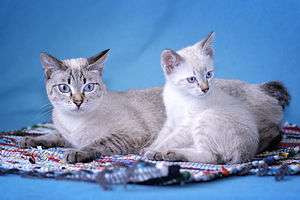Natural bobtail
A natural bobtail is an animal's tail which due to a mutated gene grows unusually short or is missing completely. The genes for the shortened tail may be dominant or recessive.
Due to legislation restricting or preventing docking, natural bobtails are growing in popularity among the dog fancy for some traditionally docked breeds. For example, one Boxer breeder and geneticist in England has successfully petitioned the Kennel Club for permission to cross Corgis into his lines and then backcross to Boxers, introducing the gene into his lines.[1] This would have been unheard of in decades past. A number of these bobtail Boxers have been exported to various countries around the world.
However there are some breeds, the Rottweiler for example this NBT are not recognised as accepted in the Country of Origin Breed Standard.
Animals with a natural bobtail
Cats

More than one gene is responsible for tail suppression in cats; research is incomplete, but it is known that the Japanese Bobtail and related breeds have a different mutation from that found in the Manx and its derivatives.
- American Bobtail
- Japanese Bobtail – tails are short and kinked, but not entirely absent
- Karelian Bobtail[2] – tails are short and kinked, but not entirely absent
- Korean Bobtail – tails are short and kinked, but not entirely absent
- Kurilian Bobtail
- Manx, and Cymric or Manx Longhair; tails range from full to entirely absent
- Mekong Bobtail,[3] a variant of the Siamese
- Pixie-bob
Experimental breeds (mostly cross-breeds of the above):
- Alpine Lynx cat
- American Lynx cat
- Desert Lynx cat
- Highlander cat
- Owyhee Bob
Dogs
A mutation in a gene called the T-box transcription factor T gene (C189G) accounts for natural bobtails in 18 of 24 dog breeds studied, but not in another 6 dog breeds, for which the genetic mechanism is yet to be determined.[4]
Natural bobtail dog breeds with C189G mutation:[4]
- Australian Shepherd
- Austrian Pinscher
- Australian Stumpy Tail Cattle Dog
- Braque du Bourbonnais (Bourbonnais Pointer)
- Braque Francais (Savoy Sheepdog)
- Brazilian Terrier
- Brittany Spaniel
- Croatian Sheepdog
- Danish–Swedish Farmdog
- Donggyeongi
- English Shepherd
- Jack Russell Terrier
- Karelian Bear Dog
- Mudi
- Pembroke Welsh Corgi
- Polish Lowland Sheepdog
- Pyrenean Shepherd
- Schipperke
- Spanish Water Dog
- Swedish Vallhund
Natural bobtail dog breeds without C189G mutation:[4]
- Boston Terrier
- English Bulldog
- King Charles Spaniel
- Miniature Schnauzer
- Parson Russell Terrier
- Rottweiler
Dog breeds into which the C189G mutation has been introduced by cross-breeding:
Dog breeds where natural bobtails have not yet been tested for C189G mutation:
- Entlebucher Mountain Dog
- French Bulldog
- McNab
- Miniature Fox Terrier
- Old English Sheepdog
- Rat Terrier
- Tenterfield Terrier
Breeds in this sub-list often have full tails.
References
- The Fantastic Account of Dr Bruce Cattanach’s Bobtail Boxers Virginia Zurflieh, boxerunderground.com, Oct 1998.
- "WCF - World Cat Federation". Wcf-online.de. Retrieved 19 May 2018.
- "WCF - World Cat Federation". Wcf-online.de. Retrieved 19 May 2018.
- Hytönen, Marjo K.; et al. (1 March 2009) [2008]. "Ancestral T-Box Mutation Is Present in Many, but Not All, Short-tailed Dog Breeds". Journal of Heredity. 100 (1): 236–240. doi:10.1093/jhered/esn085. PMID 18854372. The study found 17 of 23 newly studied breeds had the gene, in addition the Pembroke Welsh Corgi identified in previous research.